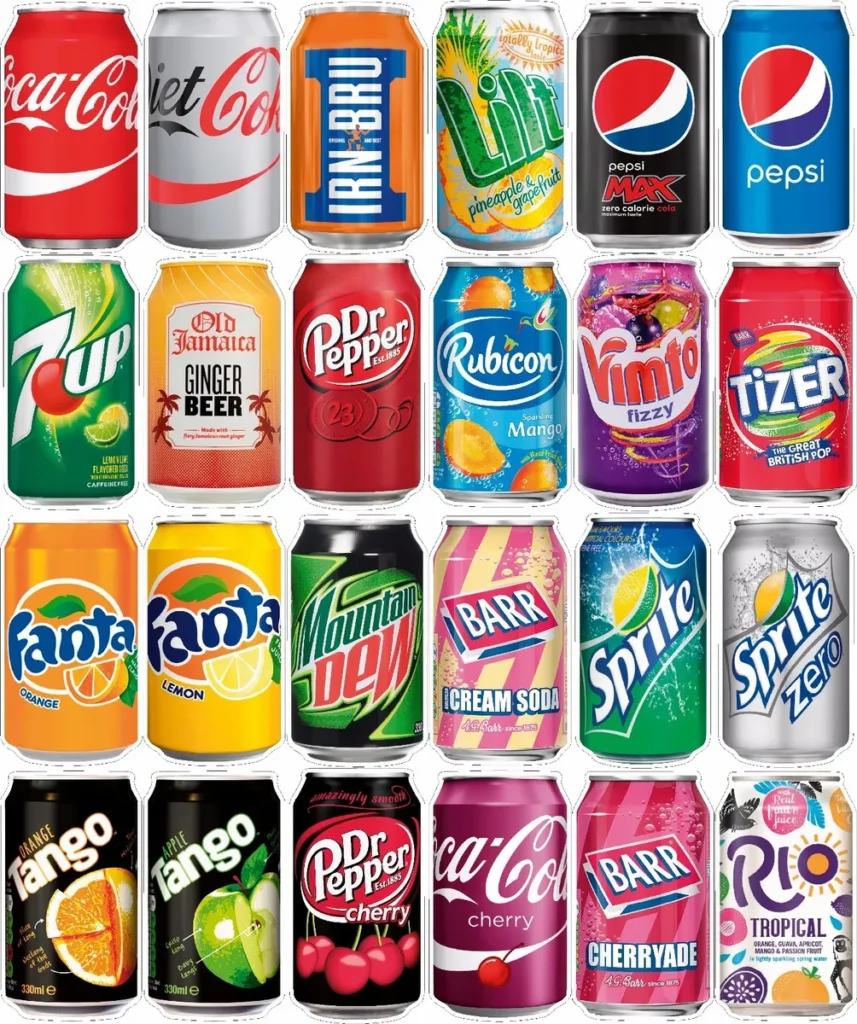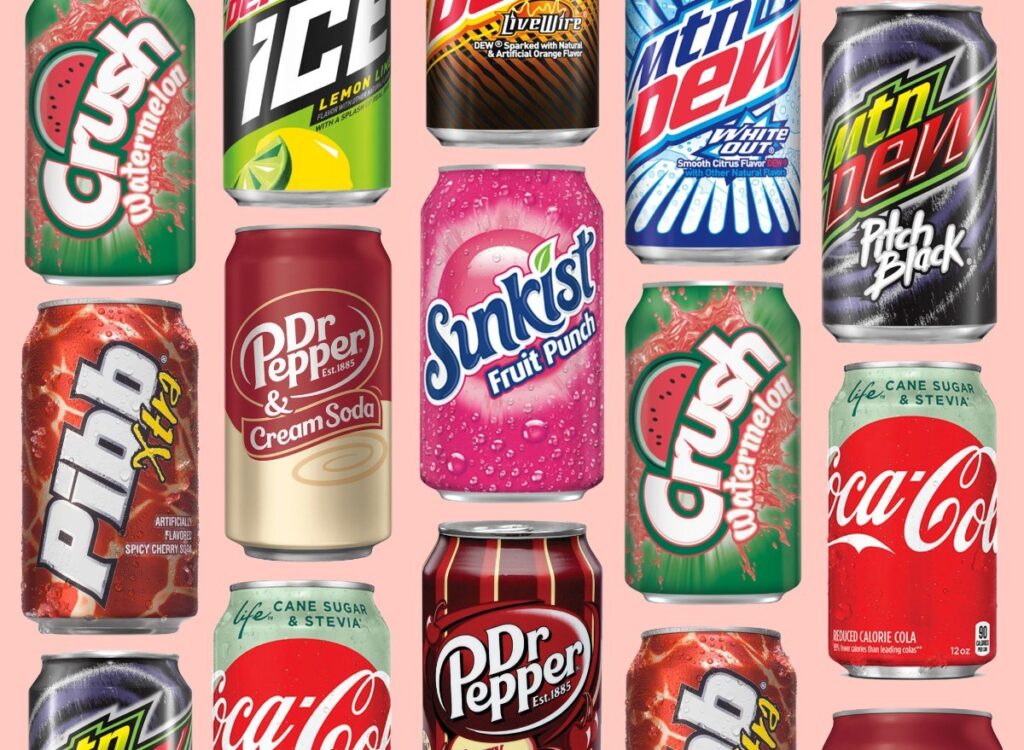Introduction
In the glamorous world of advertising, few relationships are as high-profile and, at times, as turbulent as the one between soda brands and celebrity endorsements. From Pepsi’s iconic campaigns to Coca-Cola’s memorable jingles, soda companies have long relied on star power to boost their appeal. However, this partnership is not without its pitfalls. In this article, we’ll dive into the history, the highs and lows, and the sometimes outright bizarre tales of soda brands’ flirtations with the rich and famous.

The Golden Age of Celebrity Endorsements
The Birth of a Marketing Strategy
Back in the mid-20th century, when television was in its infancy, soda companies discovered the magic formula: celebrities. They quickly realized that a famous face could sell more soda than any amount of regular advertising. Enter the golden age of celebrity endorsements.
Pepsi and Michael Jackson: A Match Made in Pop Heaven
One of the most iconic partnerships in advertising history was Pepsi’s collaboration with Michael Jackson. In 1983, Pepsi signed a deal with the King of Pop that would forever change the landscape of celebrity endorsements. Jackson’s charisma and widespread appeal made him the perfect ambassador for the brand. The partnership was a massive success, with memorable commercials and promotional tours that cemented Pepsi’s image as the “choice of a new generation.”
Coca-Cola’s Strategy: A Different Approach
Coca-Cola, Pepsi’s arch-nemesis, took a slightly different approach. Instead of focusing on one major star, Coke opted to feature a variety of celebrities in their ads. From movie stars to athletes, Coca-Cola’s diverse lineup helped the brand maintain a broad appeal. Their famous “I’d Like to Buy the World a Coke” campaign in 1971 featured a multi-ethnic group of young people singing together, promoting unity and happiness, with the soda as the universal connector.
The Rollercoaster of Relationships
The Highs: When It All Goes Right
When celebrity endorsements go right, they can create magic. Think of Britney Spears’ Pepsi commercials in the early 2000s. Her energy and popularity brought a fresh, youthful vibe to the brand. These ads became cultural touchstones, remembered fondly by fans and advertisers alike. Similarly, Beyoncé’s partnership with Pepsi in 2013 showcased the synergy between music, dance, and soda in a visually stunning way.
The Lows: When It All Goes Wrong
However, the relationship between soda brands and celebrities can be as volatile as a soda bottle that’s been shaken too hard. Take, for instance, the infamous Kendall Jenner Pepsi commercial from 2017. Intended to convey a message of unity and peace, it was instead widely criticized for trivializing social justice movements. The backlash was swift and severe, leading to the ad being pulled and Pepsi issuing an apology.
Scandals and Controversies
Sometimes, the controversies stem from the celebrities themselves. Tiger Woods’ fall from grace in 2009 had ripple effects that hit his endorsement deals, including those with Gatorade, a PepsiCo brand. Similarly, when pop star Justin Bieber faced legal troubles and public outcry, his association with brands like Pepsi became a topic of debate. These incidents highlight the risk soda companies take when they hitch their wagon to a celebrity’s star.

The Science Behind the Strategy
Why Do Soda Brands Rely on Celebrities?
The rationale is simple: celebrities command attention. In an oversaturated market, getting noticed is half the battle. A well-chosen celebrity can make a brand seem more appealing, relatable, or aspirational. This is particularly important for soda brands, which often target younger demographics who are more influenced by celebrity culture.
The Psychology of Influence
The psychology behind this strategy is fascinating. Studies show that consumers are more likely to trust and buy products endorsed by their favorite celebrities. This phenomenon, known as the “halo effect,” means that the positive attributes associated with the celebrity (such as attractiveness, talent, or likeability) transfer to the product they endorse. For soda brands, this means increased visibility, brand loyalty, and ultimately, higher sales.
Modern Trends and Social Media
The Rise of Social Media Influencers
In recent years, the landscape of celebrity endorsements has shifted. Social media influencers have become the new stars of the advertising world. Platforms like Instagram, TikTok, and YouTube have given rise to a new breed of celebrity: the influencer. These individuals often have millions of followers and can sway consumer behavior with a single post.
Soda Brands Adapting to the Times
Soda brands have adapted to this change by partnering with influencers who have strong followings among their target demographics. For instance, Coca-Cola has collaborated with YouTubers and Instagram stars to promote their products. These partnerships often involve more interactive and engaging content, such as challenges, giveaways, and behind-the-scenes glimpses, making the advertising feel more organic and less intrusive.
The Authenticity Factor
One reason why influencer partnerships can be so effective is the perceived authenticity. Unlike traditional celebrities, influencers often have a more direct and personal connection with their audience. This makes their endorsements seem more genuine and trustworthy. For soda brands, this means a more engaged and receptive audience, which can translate into higher sales and brand loyalty.
Notable Campaigns and Their Impact
Pepsi’s “Live for Now” Campaign
One of Pepsi’s more recent campaigns, “Live for Now,” aimed to capture the spirit of the younger generation. Featuring stars like Kendall Jenner, this campaign sought to connect with a millennial audience through themes of spontaneity and social consciousness. While the campaign had its missteps, it also showcased Pepsi’s willingness to take risks and adapt to contemporary trends.
Coca-Cola’s “Share a Coke” Campaign
Coca-Cola’s “Share a Coke” campaign, launched in 2011, was a masterstroke in personalized marketing. By replacing their logo with common first names, Coke created a highly shareable and personal experience for consumers. This campaign was hugely successful, leading to increased sales and brand engagement. While it didn’t rely on traditional celebrity endorsements, it leveraged the power of personal connection, making every customer feel like a star.

The Future of Celebrity Endorsements
Navigating a Changing Landscape
As the advertising landscape continues to evolve, soda brands must navigate new challenges and opportunities. The rise of digital media, changing consumer preferences, and increasing scrutiny on social issues all play a role in shaping future strategies.
The Importance of Authenticity
Moving forward, authenticity will be more important than ever. Consumers are becoming increasingly savvy and skeptical of traditional advertising tactics. Soda brands will need to ensure that their celebrity partnerships feel genuine and align with their values. This might mean partnering with celebrities who are genuinely passionate about the brand or who share similar social and environmental values.
Embracing Diversity and Inclusion
Diversity and inclusion are also critical factors. Modern consumers expect brands to reflect and respect a diverse range of voices and experiences. Soda brands will need to ensure that their advertising campaigns are inclusive and representative of the world we live in. This means not only featuring a diverse range of celebrities but also telling stories that resonate with a broad audience.
Lessons Learned and Key Takeaways
The Power of Celebrity
There is no denying the power of celebrity in advertising. A well-chosen star can boost a brand’s profile, create memorable moments, and drive sales. However, this power comes with risks. Brands must carefully consider the potential pitfalls and be prepared to manage any fallout from controversial or scandal-prone celebrities.
The Need for Strategy and Planning
Successful celebrity endorsements require careful planning and strategy. Brands need to choose celebrities who align with their values and appeal to their target audience. They also need to be prepared to manage the relationship and handle any potential crises that may arise.
The Role of Creativity
Creativity is key to standing out in a crowded market. The most successful campaigns are those that think outside the box and create memorable, engaging content. Whether it’s a viral video, a catchy jingle, or an innovative social media campaign, creativity can make all the difference.
Embracing Change
The world of advertising is constantly evolving, and soda brands need to stay ahead of the curve. This means embracing new trends, technologies, and platforms. It also means being willing to take risks and experiment with new ideas. By staying flexible and adaptive, soda brands can continue to thrive in a rapidly changing landscape.
Conclusion
The relationship between soda brands and celebrity endorsements is a fascinating and complex one. It’s a world where high stakes and high rewards often go hand in hand. From the golden days of Michael Jackson and Pepsi to the modern era of social media influencers, this partnership has seen its fair share of triumphs and tribulations. As the advertising landscape continues to evolve, one thing remains clear: the allure of celebrity will always hold a special place in the world of soda advertising. Whether through traditional stars or digital influencers, the power of a famous face is a tool that soda brands will continue to wield, for better or for worse.